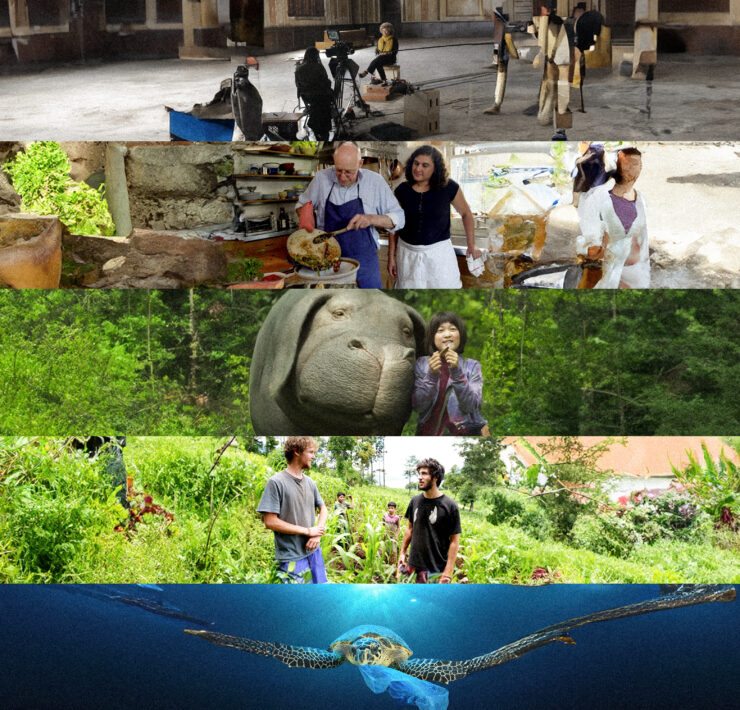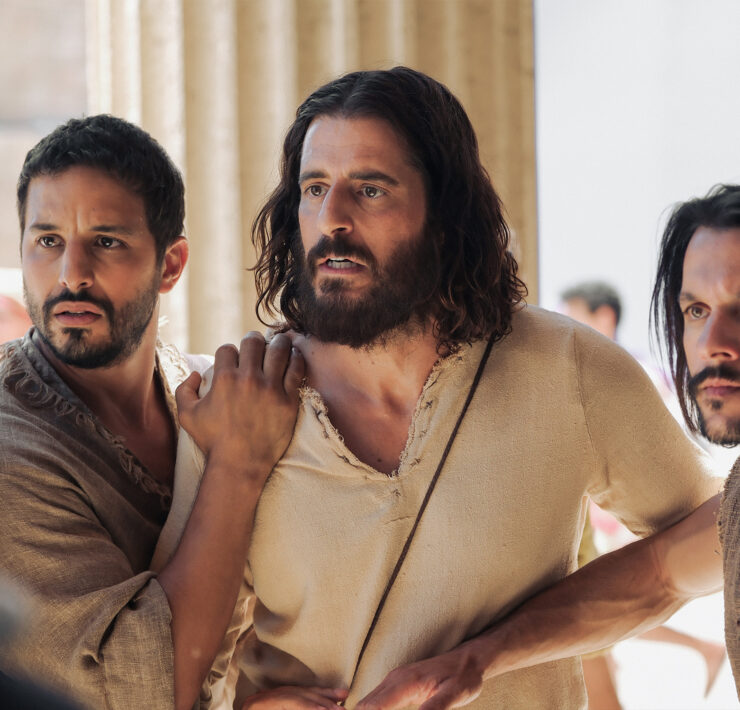Ten years ago, three guys named Daniel Katz, David Fenkel and John Hodges, got enough scratch together to get their own film company off the ground. They named it A24 after the Italian motorway Katz was driving on when he came up with the idea, and they promptly got to work releasing small, buzzy indie movies that would have a tough time competing at major studios. They started with the droll Charlie Sheen and Bill Murray comedy A Glimpse Inside the Mind of Charles Swan III and the trippy, edgy Selena Gomez and James Franco drama Spring Breakers.
Within a few years, they’d released well-received sci-fi puzzlers like Oscar Isaac’s Ex Machina, somber dramas like Brie Larson’s Room and, in what would become something of a tell, a cerebral horror story with Anya Taylor-Joy’s The VVitch. In a decade, A24 has become one of the few movie studios that can serve as its own star, with those three letters all but certain to draw interest from filmgoers. They’ve kicked off a revival of Adam Sandler’s career with Uncut Gems, won a Best Picture for Moonlight and successfully veered into television with shows like Euphoria. This year, Everything Everywhere All at Once became their highest-grossing movie ever, knocking Lady Bird out of the top spot.
But amidst all the accolades, there’s another impossible to miss element shared by a disproportionate amount of A24 movies. Why do so many of them seem obsessed with religion?
Spirituality isn’t exactly a rare topic in filmmaking, especially among the mature, mid-budget fare preferred by A24. But this studio has a lot of movies that not only feature religion as a primary subject, but frequently the primary subject. Let’s break it down.
Controlling Christianity
Rosemary’s Baby. The Exorcist. The Omen. Hollywood has long had a knack for finding a spooky angle on Christian teaching. It’s one of the oldest tricks in the horror genre — take something familiar and make it a little freaky. In 2016, filmmaker Robert Eggers brought this energy to A24 with The VVitch, introducing the world to Anya Taylor-Joy as a young teen in 1630s New England, whose devout Christian family is thrown into uproar when their baby goes missing and a rumored witch appears to be the culprit.
Like Spielberg’s infamous shark, Eggers knows that what you don’t see is scarier than what you do. The movie’s terror comes from what’s just outside of our view and the insinuation, rather than depiction, of sinister happenings in the woods. And we grow more anxious about who or what this alleged witch might be, so does the on screen family, whose religious devotion gets twisted into paranoia and then violence — a grim foreshadowing of the Salem Witch Trials the events of this movie predates by a generation or so.
In this, we have the first of A24’s many explorations of Christians as not just scary, but scared, clinging to their beliefs as a means of control no matter how much the world around them spirals away from anything their dogma can explain. This is a theme that would return again to varying degrees in A24 movies like Saint Maud and X. The Children Act isn’t a horror movie per se, but it does tell the story of a young Jehovah’s Witness refusing a life-saving blood transfusion because it’s against his religion. Likewise, 2021’s The Green Knight can be read as an allegory of how Christianity collided with, retreated from and in some ways subsumed paganism during its spread across Europe.
Commonplace Christianity
Though far from their first movie, it’s safe to say that Greta Gerwig’s Lady Bird put A24 on the map in a new way both at the box office and among critics. It became an instant classic of the coming of age drama, thanks in no small part to Saoirse Ronan’s remarkable performance.
Religion is more of a supporting character in Lady Bird than a main player, but Lady Bird’s Catholic school upbringing overshadows her every attempt to break free. In this movie, the aesthetic of Catholicism weighs heavily even as Catholic teaching seems to mostly soar over students’ heads (Lady Bird gets caught snacking on unconsecrated communion wafers). Gerwig and wisely leave much of the doctrine in the background, but it is very prominently in the background, from the crucifix conspicuously just out of focus on the poster to the King James-esque script of the title.
In an interview with NPR, Gerwig told Terry Gross that the movie was inspired by her reading about the lives of saints. “I was always interested in who they were as people and that they both were these people who were divinely inspired, but they were also kind of just annoying teenagers.”
Lady Bird is the most prominent example, but Christianity shows up like this in a lot of movies, from Waves to Minari to Spring Breakers. In this, A24 movies recognize something many movies ignore: religion is a part of people’s lives. For many Americans, it’s not the main part. But for most households, religion is a real factor and showing that is part of making your characters feel authentic and dimensional.
Cults and Christianity
One of A24’s favorite ways to tackle religion is through cults. Most recently, we saw that in Ari Aster’s Midsommar, which dares to ask the question “Can a movie still be scary if it all takes place in gorgeous, sunlit fields?” Reader, it can.
Florence Pugh stars as Dani, a young woman who has just lost her entire family to carbon monoxide poisoning. She joins her boyfriend and his friends on a trip to Sweden, where they fall in with a rural commune and things quickly take a turn for the very bad. It turns out this commune observes some pretty odd religious practices, ones that have a body count.
In this, Hereditary and Under the Silver Lake, strange cults play a prominent role — often inverting or subverting what we think we know about religion for something stranger and, maybe, more violent. In the A24-verse, cults are full of rabid devotees who will happily slit your throat if that’s what their dogma demands. You can read a lot of things into movies like Midsommar and Hereditary, but one lesson looms over them all: the danger of sticking your nose where it doesn’t belong.
Cathartic Christianity
One final movie is worth consideration here, and that’s First Reformed, maybe A24’s most explicitly Christian movie and an outlier among its filmography. The Paul Schrader drama follows Ethan Hawke as Ernst Toller, the pastor of the First Reformed Church in Snowbridge, New York. Toller is moved by the emotional plight of one of his parishioners, a young man moved to despair over mankind’s inaction on climate change. Their burgeoning friendship takes several wild turns which leads Toller down his own spiritual path of lamentation, radicalization and, ultimately, redemption.
First Reformed puts Christianity in a very different light than we’re used to seeing, with Toller being driven over and over to his (and the movie’s) central question: “Will God forgive us for what we’ve done?” That’s a good question, and it’s one Toller’s trying to answer on a level both large (“will God forgive humanity?”) and small (“will God forgive me?”). The movie is interested in the answer to this question too, though it goes about finding it in a circuitous route via one of the most intense third acts in A24’s catalog. In this framework, Christianity is a source of both conflict and catharsis; antagonism and absolution.























